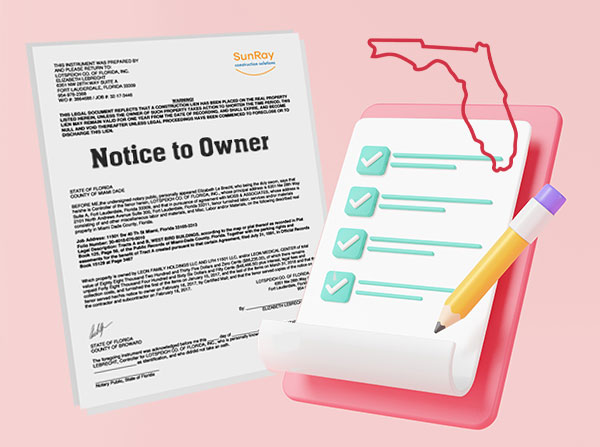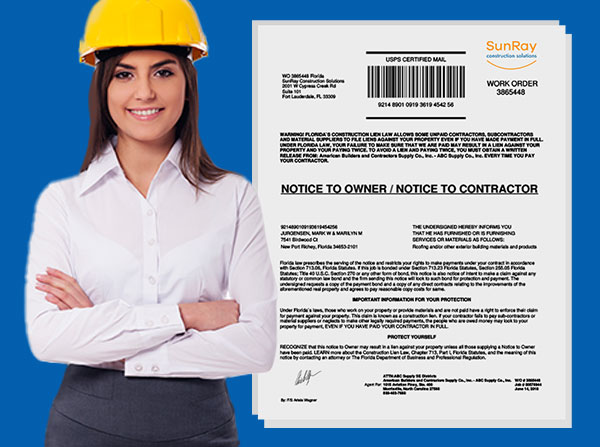Florida Statute 713.06 Explained: Protecting Your Lien Rights with a Notice to Owner
Learn how Florida Statute 713.06 affects your construction lien rights and why sending a proper Notice to Owner is essential for protecting your payments.
Last updated:
Oct
23
,
2025
Published:
October 23, 2025
3 mins
Read
In the construction industry in Florida, staying on top of your contractual rights is key. One crucial but sometimes misunderstood piece of legislation is Florida’s construction lien law, and in particular Section 713.06.
If you are a subcontractor, material supplier, or any party working indirectly on a project, understanding Section 713.06 and the required Notice to Owner can make the difference between protecting your lien rights and losing them.
Overview of Florida’s Construction Lien Law
Florida’s lien law is found in Chapter 713 of the Florida Statutes. Its purpose is to give laborers, subcontractors, material suppliers, and others the right to place a lien on real property for unpaid work or materials that improve that property.
The law distinguishes between those who have a direct contract with the owner (in privity) and those who do not. Section 713.06 applies mainly to parties who are not in privity with the owner, such as subcontractors or suppliers. It sets out deadlines, notice requirements, and service obligations. Failing to follow them can result in losing your lien rights entirely.
Importance of Section 713.06
Section 713.06 is important because it clearly explains who must serve a Notice to Owner, when that notice must be served, and what information it must include. It also protects owners and lenders by outlining what constitutes proper payment once a notice is received.
If you are a subcontractor or supplier working on a Florida project, Section 713.06 is one of your most important safeguards.
Understanding Florida Statute 713.06
.jpg)
Purpose and Scope
The statute provides that any person who furnishes labor, services, or materials for the improvement of real property, but who does not have a direct contract with the owner, may claim a lien if they comply with the notice and filing requirements.
For these individuals, the service of a Notice to Owner is a prerequisite to recording a valid claim of lien. The statute also ties the total of all liens to the amount of the direct contract with the owner, ensuring that lien rights remain within the bounds of the original agreement.
Who It Protects
Section 713.06 protects those who do not have a direct contract with the owner. This includes:
- Subcontractors who work under a general contractor
- Sub-subcontractors
- Material suppliers who provide goods or services indirectly
It also protects owners and lenders by ensuring that they receive notice of who is contributing to the project, so they can avoid double payments.
If you have a direct contract with the owner, the notice requirement generally does not apply to you.
Key Requirements Under the Law
The 45-Day Rule
Anyone who is not in privity with the owner must serve the Notice to Owner either before beginning work or within 45 days of starting to furnish labor, services, or materials.
The notice must also be served before the owner makes the final payment to the contractor after receiving the contractor’s final payment affidavit. Missing this timeline can completely invalidate your lien rights.
Notice to Owner Content Requirements
.jpg)
The Notice to Owner must include specific information to be valid. This includes:
- A clear heading that states “NOTICE TO OWNER”
- The name and address of the property owner
- A warning that unpaid contractors or suppliers may file a lien even if the owner has paid the contractor
- A description of the work or materials provided
- The lienor’s name, address, and signature
- Copies to all required parties such as the contractor or subcontractor
Even small omissions or errors can cause major problems, so it is essential that the notice be carefully prepared.
Proper Service Methods
The notice must be properly served in accordance with the procedures in Chapter 713. Acceptable service methods include:
- Hand delivery to the owner or an authorized agent
- Certified or registered mail
- Overnight delivery with tracking
If the Notice of Commencement lists additional parties such as lenders or agents, they must also receive copies. Proof of service is critical in case of any future dispute.
How Section 713.06 Protects Lien Rights
.jpg)
- Prepare and serve a Notice to Owner – Do this before or shortly after beginning work on the project.
- Send the notice properly – Deliver it to the property owner and any listed representatives within the required time frame.
- Continue performing your contract – Complete your work as agreed, while maintaining proper documentation.
- Record a Claim of Lien if unpaid – Only do this if the Notice to Owner was properly served.
- Leverage the recorded lien – The lien provides legal leverage to help secure your payment.
- Understand the risk of improper notice – If the Notice to Owner wasn’t served correctly or on time, the lien can be challenged and declared invalid.
Step-by-Step Legal Protection
- Before or shortly after beginning work, prepare and serve a proper Notice to Owner.
- Send the notice to the owner and any listed representatives within the required time frame.
- Continue performing your contract as agreed.
- If you are not paid, record a Claim of Lien under Chapter 713. This step is only valid if the Notice to Owner was properly served.
- The recorded lien gives you legal leverage to secure payment.
- If the notice was not served correctly or on time, the lien can be challenged and declared invalid.
.jpg)
Real-World Example
Imagine a supplier delivers materials to a project through a subcontractor. The supplier serves a Notice to Owner within 45 days of the first delivery. If the subcontractor fails to pay, the supplier can legally enforce payment through a lien because they complied with Section 713.06.
On the other hand, if a subcontractor starts work but never serves the notice, and the owner pays the general contractor in full, the subcontractor will have no lien rights once payment has been disbursed.
Common Misunderstandings About Section 713.06
Myths and Mistakes Contractors Make
- “I’m already working on the job, so I don’t need to serve a notice.”
False. If you do not have a direct contract with the owner, you must serve a Notice to Owner to preserve your rights.
- “I can send the notice late, and it will still count.”
Incorrect. Missing the 45-day deadline is a complete defense against your lien claim.
- “Serving the notice means I already have a lien.”
Wrong. The notice only preserves your right to file a lien later. It does not create one.
- “If the owner already paid the general contractor, I can still lien the property.”
Only if you properly served the Notice to Owner before that payment.
- “The 45-day rule is flexible.”
It is not. Treat it as a hard deadline to avoid disputes.
.jpg)
Penalties for Non-Compliance
Failing to serve a timely or accurate Notice to Owner results in losing your lien rights. You may still pursue payment through other means, but you will not have the leverage of a lien.
For owners, ignoring a proper notice or making improper payments after receiving one can lead to double liability. Lenders who fail to account for valid notices can also face exposure.
Best Practices for Staying Compliant
- Track the date you start work or deliver materials. This marks the beginning of your 45-day window.
- Serve the notice as early as possible.
- Use the statutory form and double-check all required fields.
- Serve it by certified mail or hand delivery to ensure proof of receipt.
- Keep copies of all documents and mailing receipts.
- When you receive payment, issue a lien release to maintain transparency.
- Consider using a professional notice service or software to automate and verify each step.
Conclusion
Every contractor, subcontractor, and supplier working in Florida should understand Section 713.06 of the Florida Statutes. Serving a timely and accurate Notice to Owner is one of the most effective ways to protect your payment rights. It safeguards both you and the property owner, ensuring that everyone involved in a project knows who is owed what.
Taking this step is not just about legal compliance. It is about protecting your business, your work, and your right to get paid for the value you provide.
FAQs
What is Florida Statute 713.06?
t is the section of Florida’s construction lien law that governs lien rights for people who do not have a direct contract with the owner. It requires these parties to serve a Notice to Owner before they can record a lien.
Who needs to comply with Section 713.06?
Subcontractors, sub-subcontractors, and material suppliers who furnish labor or materials to a project without a direct contract with the property owner must comply.
What happens if you miss the 45-day deadline?
If you miss the deadline, your right to file a lien is lost. You may still be owed money, but you will not have lien protection.
Does sending a Notice to Owner automatically protect your lien rights?
No. Sending the notice is only one part of the process. You must also comply with other requirements, such as recording your lien within the statutory time limits.
How can SunRay ensure compliance with Section 713.06?
SunRay can help by tracking project start dates, preparing and serving accurate notices, confirming proof of delivery, and maintaining all documentation. Using a professional service helps ensure every requirement under Section 713.06 is met on time and without errors.




.jpg)







